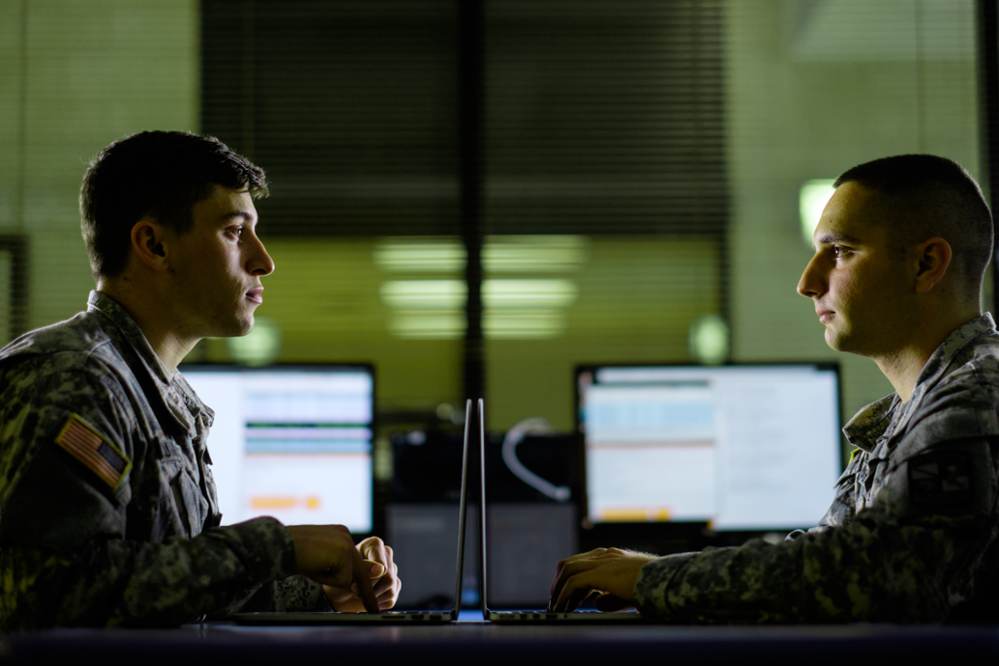Cyber duty calls
JMU in the Community
Two James Madison University students are honoring their families’ tradition of military service while joining a select group of ROTC cadets preparing to enter the world of cyber security for the U.S. Army.
Joseph Daoud and Evan Plumley are assigned to report to Army Cyber Command following May commencement and ROTC commissioning as Army second lieutenants. The men are two of only 15 ROTC cadets from throughout the nation selected for the command. This is the first year that commissioning cadets are eligible for cyber assignment.
Army Cyber Command is responsible for planning and conducting Army network operations and the defense of all Army networks.
Both Daoud and Plumley have followed very similar academic paths throughout their four years at JMU. They are earning degrees in computer science with Information Systems Security Professional certification and minors in military leadership through their military science/ROTC experiences.
The son of a captain in the Army Reserve, Daoud of Poquoson, Va., had an inside view of JMU through the eyes of his sister, Miriam Daoud, a 2012 nursing and ROTC graduate. “She always had good things to say about JMU,” Daoud said. “The leadership experience she had really appealed to me.” He joined the ROTC Detachment under the Simultaneous Membership Program and is an Army National Guardsman, combining Guard duty with Army ROTC duties on campus.
Daoud and Plumley of Moseley, Va., have both assumed increasing leadership roles while in JMU ROTC. Both have risen from team, squad and platoon ranks to roles as company Executive Officer. Plumley, the grandson of military veterans and brother of two members of the U.S. Air Force, has also served as head TAC, the technical evaluator of younger cadets.
Both have balanced their ROTC commitments with the demanding requirements of the Department of Computer Science curriculum, which Daoud and Plumley describe as rigorous, but what they expected of the JMU program.
“I was always interested in computers,” Daoud said. “I played computer games growing up and liked to learn about them and how they worked.” He has fond memories of his kindergarten teacher letting him take a donated computer apart to see its inner components.
Once he entered JMU’s computer science program, Daoud found he was interested in the security side. “I’m interested in what I can make this computer do. This year I’ve been ‘breaking the software,’ to learn how to defend against attacks. We try to break into each other’s computers. This helps us to understand techniques people use.”
Plumley describes the process as “defensive hacking” to force the learning of different ways to secure computers from attack.
“When you’re writing code and algorithms in computer science, it’s one big critical-thinking problem; it’s problem solving to the max,” said Daoud. “What do I need to put in this code to make this computer do exactly what I want it to?”
He and Plumley believe their computer science skills and military leadership pair well for their future responsibilities.
“I came into the (ROTC) program with some leadership skills; however, I wasn’t the ‘natural leader,’ Plumley said. “I was a very low-key, quiet, follow-the-lead kind of guy. ROTC brought out the leadership capabilities that I have. ROTC helped me take the mantle of leadership and helped me to not be afraid of responsibility and the possibility of failure.”
“ROTC has helped me to realize I’m at the helm no matter what and this is my job.”
The Army employs offensive and defensive measures to secure the defense information network. While Daoud does not know which “team” he’ll be assigned, he says, “I feel very much prepared whatever my assignment.”
# # #

